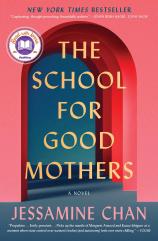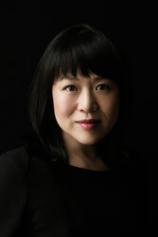Author Talk: January 6, 2022
THE SCHOOL FOR GOOD MOTHERS is Jessamine Chan’s debut novel and this month’s “Read with Jenna” Today Show Book Club pick. It revolves around one lapse in judgment that lands a young mother in a government reform program where custody of her child hangs in the balance. In this interview, Chan talks about how she came to tell this particular story, her writing process and the research she conducted for the book, what surprised her the most when she became a mother, the concerns she had about motherhood and the impact it would have on her ability to write, the authors who have inspired her, and what she’s working on now.
Question: Congratulations on publishing THE SCHOOL FOR GOOD MOTHERS! I’m hoping you can tell me more about the book’s origins. How did you come to tell this particular story?
Jessamine Chan: Thank you so much. This story emerged from a few different seeds of inspiration. When I began this project in 2014, I was consumed with anxiety about whether to have a baby. I was in my mid-30s, and the time pressure felt very real, though my partner and I didn’t feel ready. While wrestling with my ambivalence, I happened to read an article about a mother fighting to regain custody of her son after leaving him home alone and her nightmarish experience with the family court system. The clinical language used by Child Protective Services, and the keen sense of injustice I felt on that mother’s behalf, lodged in my memory. It was around this time that I first developed the idea for the school, fueled by this creative spark and all the musing I was already doing on the subject of motherhood. I began to imagine my protagonist, Frida, a mother who’s messy and selfish and desirous, vulnerable and yearning and real. A mother who makes one unforgivable mistake.
Q: What was your writing process for this book? How has it changed over the seven years you worked on the book?
JC: My process was that of a short story writer learning how to write a novel by trial and error. I initially thought I was working on a complicated short story, which was the result of an incredibly productive writing day where I basically laid out the foundation of the whole book, with all the main characters, Frida’s arc and the voice. It was the burst of inspiration that every writer dreams about. It took a year and a half to turn that promising story draft into the first draft of a novel, and several years to rewrite that draft into a manuscript with proper chapters.
In that first year, I did compose an outline of the school’s curriculum, had a forest of Post-it notes on my walls, and had a character list handy, but otherwise didn’t have the world’s most orderly process. I’m not sure that the process changed over the years. Each day’s work required committing to the project all over again and convincing myself that I could do it. Thus far, I haven’t been the sort of writer who plans things out ahead of time, though I envy those who do! Ideas emerge from scribbling, and sometimes it takes an enormous amount of scribbling to have a good idea.
Q: You started writing THE SCHOOL FOR GOOD MOTHERS before having your daughter. How did having a child affect how you approached writing it?
JC: I’d just started revising my initial draft when my daughter was born, and when I started really working again when she was 10 months old, I found that I had to rewrite everything. I had to pare down the lessons, for example. I didn’t know until she was a toddler that just getting out the front door can be a 45-minute ordeal with so many Big Feelings. Most of all, becoming a mother showed me how to write about Frida’s love for Harriet. Everyone tells you how much you’ll love your baby, but I found that idea pretty abstract. Frida became much more tender and loving as I revised. She became a more competent parent. The book also became funnier, because many aspects of parenting are pretty ridiculous.
Q: What were you most surprised by when you became a mother? Was there anything in the “cult of motherhood” that you were unfamiliar with or unprepared for? Is there any advice you’d give to new mothers trying to figure out their own style of parenting?
JC: Though I’m always scrambling to manage my time better, I’m surprised by how much I enjoy taking care of my daughter. I felt so much anxiety about the concept of motherhood that I couldn’t imagine the pleasure of our daily rituals, like giving her a bath, or cuddling in the morning, or watching her do her crazy songs and dances at bedtime now that she’s older. I was also surprised by the deep friendships I developed with other moms. With my three closest mom friends from West Philly, we have an unshakable bond and remain in constant contact even though we no longer live in the same neighborhood.
I was pretty familiar with the “cult of motherhood” because I read about it so much while pregnant. In terms of the earliest days, I felt unprepared for my struggles with nursing and all the pressure to call a lactation consultant and join a lactation support group, when, post C-section, I could barely walk. Overall, book research helped me be a bit kinder to myself as a parent. I thought I’d obsess about things like developmental milestones, but because of my book’s subject matter, I didn’t. Perhaps because I was obsessing about finishing the book.
As for new mothers figuring out their own style of parenting, I wish for them as much sleep and consistent, affordable childcare as possible, and supportive family and friends. It’s very hard to follow any particular parenting philosophy exactly, and my husband and I seem to only follow the philosophy that we’re doing the best we can.
Q: Frida’s bad day reflects the tension that many mothers experience between mothering and working. How do you square these two sometimes opposing forces? Were you ever worried that motherhood would affect your ability to write?
JC: Yes, this was a huge concern. Though I never worried that I’d lose the desire to write, I worried about no longer having control of my time. The only way I was able to square those opposing forces was by having childcare and a supportive partner who did half the childcare (sometimes more), all the cooking and a lot of housework. I realize that being able to afford childcare is, in our country, a privileged thing, and I wish that all American mothers had access to affordable health care, government subsidies for childcare, universal pre-K, and a recognition of the value of labor within the home.
Beyond the time crunch, mothering has opened up a new world of experiences. I tell writer friends who are debating the baby question that, yes, you’ll lose a lot of writing time, but you’ll have material for the rest of your life. I’m not sure what I would have done for this first novel if it wasn’t related to motherhood. I was lucky that my life fed the work and vice versa.
Q: There are so many topics in the book that feel prescient and cutting-edge --- government surveillance, the overreach of tech companies. What type of research did you do for this book? Did you learn anything that surprised you?
JC: The funny thing about writing a book that involves “future” technology is praying that your book is still a few steps ahead of reality by your pub date. I’m a luddite, so while I researched CPS and controversies related to the family court system, I didn’t do a ton of research about technology. Most of the best tech ideas in the book came from my good friend Keith S. Wilson, an award-winning poet who also happens to be well-versed in tech matters. I’d start off with a basic idea, and Keith would suggest fantastic alternatives. I wish I could publish margin notes that read: “This idea came from Keith!” Some of the creepiest tech elements used here are taken, per Keith’s suggestion, from what our phones do. Among other things, I was surprised to learn how much our phones monitor us.
Q: How did you write the character of Frida? Were there any sources of inspiration you drew from?
JC: Though I wouldn’t say that Frida is an autobiographical character, I stole liberally from my childhood and my experience of being a Chinese American woman and built the character from the darkest, most dangerous parts of my mind. In real life, I’m probably more like the playground mothers, but through Frida, I could think dangerous thoughts and do wild, transgressive things.
Q: As a reader, who are some of the storytellers you find inspiring and why? What are the types of stories you’re drawn to? Were there any that you reread while writing your own book?
JC: I love this question. Some of my favorite writers are Anne Carson, Dorthe Nors, Carmen Maria Machado, Karen Russell, Diane Cook, Hilary Leichter, Kelly Link, Ling Ma, Yoko Tawada, Michael Ondaatje, Angela Carter, Joan Didion, Emily Brontë, Jean Rhys, Colson Whitehead, Kazuo Ishiguro, Margaret Atwood, Marguerite Duras and Shirley Jackson. I’m most inspired by gorgeous prose and sentence-level precision. I want to feel transported by language and immersed in a world. I’m drawn to fiction that takes big risks. As suggested by this list, I gravitate toward female authors.
One of the books I had nearby while I revised was THE PRICE OF SALT by Patricia Highsmith, which I read a few pages at a time for months to help me focus on character building and interiority. The story “Orange World” by Karen Russell is a favorite and on another level in terms of capturing the strangeness of new motherhood. If I can use this space to direct readers to the exquisite novel MRS. CALIBAN by Rachel Ingalls (now back in print from New Directions!), I’ll feel that I’ve done a service to the world.
Q: As a writer, what do you hope readers take away from THE SCHOOL FOR GOOD MOTHERS?
JC: First, I’m grateful to them for reading. I hope they’ve had meaningful reading experience. I hope they’ll think about the way our society and government treats parents. On the personal level, I hope they’ll feel seen. Books have always been a lifeline for me, so I hope in some way, I can offer that to readers.
Q: Are you working on anything now? And, if so, can you tell us about it?
JC: At this very moment, I’m honing my essay-writing skills, reading as much as possible, finishing setting up my new apartment, and carrying on with pandemic parenting. I can’t wait to work on new fiction, but I’m still refilling the well. Given my superstitions regarding talking about work in progress, it may be a while before I share details once a new project is underway. But thank you for asking!




